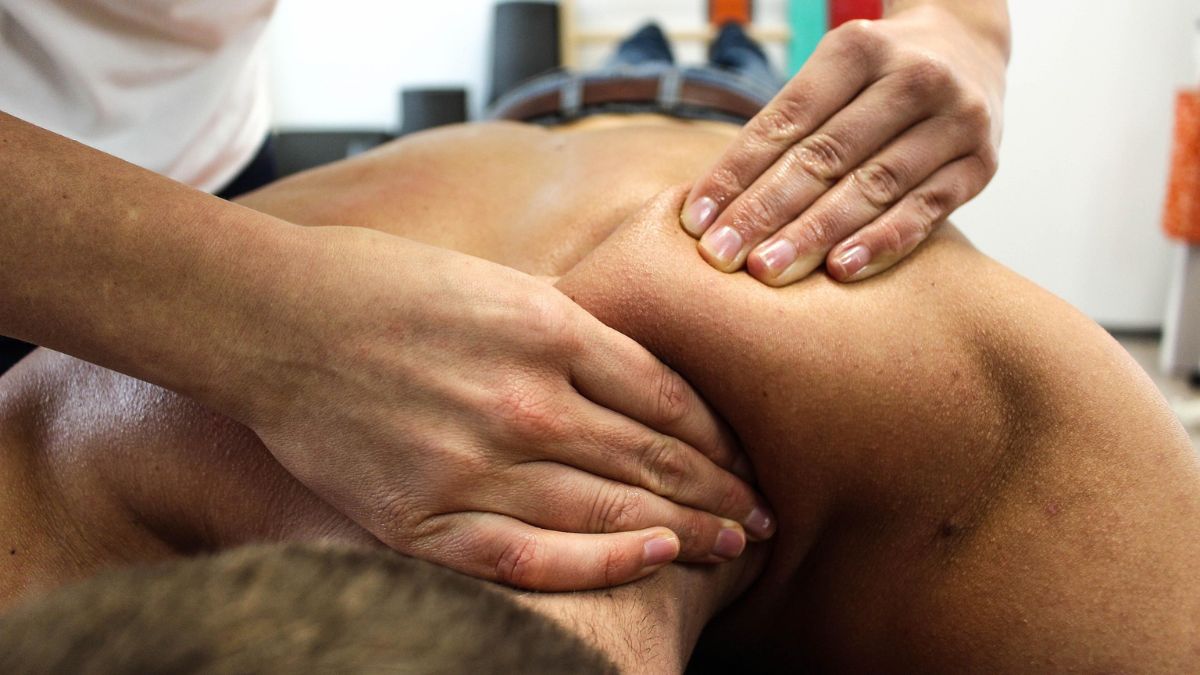You might’ve noticed some physiotherapists advertise they offer treatments for headaches and wondered: would that work?
In fact, there’s a solid body of research showing that physiotherapy treatments can be really helpful for certain types of headache.
Sometimes, however, medical management is also necessary and it’s worth seeing a doctor. Here’s what you need to know.
Cervicogenic headache: when pain travels up your neck
Cervicogenic headache is where pain is referred from the top of the neck (an area known as the upper cervical spine).
Pain is usually one-sided. It generally starts just beneath the skull at the top of the neck, spreading into the back of the head and sometimes into the back of the eye.
Neck pain and headache are often triggered by activities that put strain on the neck, such as holding one posture or position for a long time, or doing repetitive neck movements (such as looking up and down repeatedly).
Unlike in migraine, people experiencing cervicogenic headache don’t usually get nausea or sensitivity to light and sound.
Because this is a musculoskeletal condition of the upper neck, physiotherapy treatments that improve neck function – such as manual therapy, exercise and education – can provide short- and long-term benefits .
Can physio help with migraine?
Migraine is a neurological disorder whereby the brain has difficulty processing sensory input.
This can cause episodic attacks of moderate to severe headache, as well as:
sensitivity to light and noise
nausea and
intolerance to physical exertion.
There are many triggers. Everyone’s are different and identifying yours is crucial to self-management of migraine. Medication can also help, so seeing a GP is the first step if you suspect you have migraine .
About 70-80% of people with migraine also have neck pain, commonly just before or at the onset of a migraine attack. This can make people think their neck pain is triggering the migraine.
While this may be true in some people, our research has shown many people with migraine have nothing wrong with their neck despite having neck pain.
In those cases, neck pain is part of migraine and can be a warning (but not a cause or trigger) of an imminent migraine attack. It can signal patients need to take steps to prevent the attack.
On the other hand, if the person has musculoskeletal neck disorder, physiotherapy neck treatments may help improve their migraine. Musculoskeletal neck disorder is what physiotherapists call typical neck pain caused by, for instance, a sports injury or sleeping in a weird way.
You may have heard of the Watson manual therapy technique being used to treat migraine. It involves applying manual pressure to the upper cervical spine and neck area.
There are currently no peer-reviewed studies looking at how effective this technique is for migraine.
However, recent studies investigating a combination of manual therapy, neck exercises and education tailored to the individual’s circumstances show some small effects in improving the number of migraine attacks and the disabling effects of headache.
Manual therapy and neck exercises can also give short-term pain relief.
However, in some cases the neck can become very sensitive and easily aggravated in migraine . That means inappropriate assessment or treatment could end up triggering a migraine.
Physiotherapy can help with migraine but you first need a comprehensive and skilled physical assessment of the neck by an experienced physiotherapist. It’s crucial to identify if a musculoskeletal neck disorder is present and, if so, which type of neck treatment is needed.
It is also important people with migraine understand how their migraine is triggered, what lifestyle factors contribute to it and when to take the appropriate medications to help manage their migraines.
A trained physiotherapist can provide some of this information and help patients make sense of their condition and recommend the patient see their GP for medication, when appropriate.
What about tension headaches?
Tension type headache is the most common type of headache, characterised by a feeling of “tightness” or “band-like” pain around the head.
Nausea and sensitivity to light and noise are not usually present with this type of headache.
Like migraine, tension type headache is often associated with neck pain and also has different aggravating factors, not all of which are due to the neck.
Again, a detailed assessment by a trained physiotherapist is needed to identify if the neck is involved and what type of neck treatment is best.
There is some evidence a combination of manual therapy and exercise can reduce tension type headache.
Physiotherapists can also provide education and advice on aggravating factors and self management.
Seeking help
There are many types and causes of headache. If you suffer frequent headaches or have a new or unusual headache, ask a doctor to investigate.
There is good evidence physiotherapy treatment will improve cervicogenic headache and emerging evidence it might help migraine and tension type headache (alongside usual medical care).
If you are wondering if you have cervicogenic headache or if you have bothersome neck pain associated with headache, ask your doctor to refer you to a skilled physiotherapist trained in headache treatment. A careful assessment can determine if physiotherapy treatment will help.
Also Watch:
, Lecturer in Physiotherapy, The University of Queensland.
, Associate Professor in Physiotherapy, The University of Queensland.
, Teaching and research academic in Physiotherapy, The University of Queensland.
This article is republished from The Conversation under a Creative Commons license. Read the original article .
)